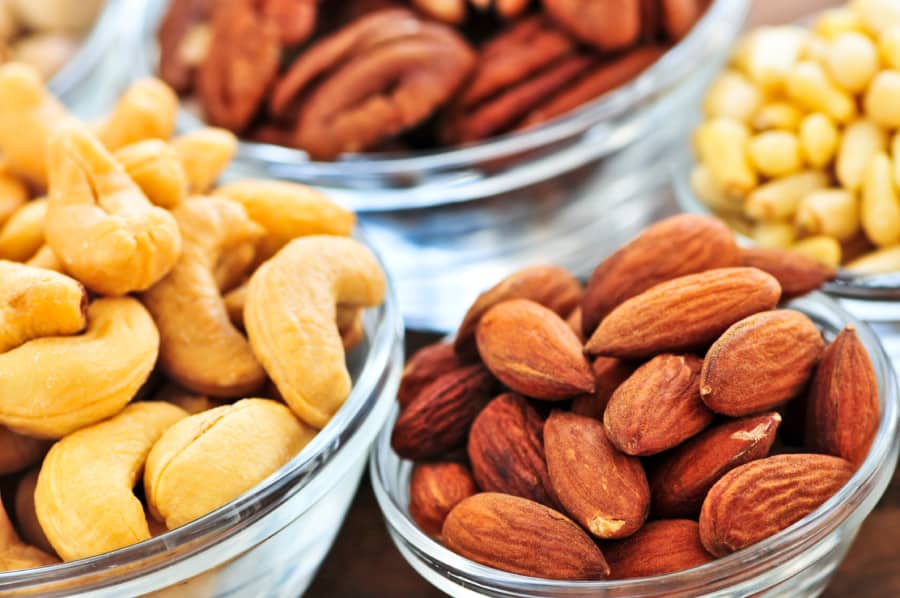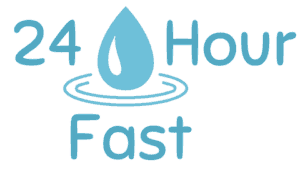When I first heard about intermittent fasting, no
But after stumbling upon the subject once again at a later time, I realized I could start in a much more attainable way. A 12-hour fast. Would you start your running practice with a marathon? Me neither. A few kilometers maybe. And that’s precisely what a 12-hour fast let you do. A stepping stone to intermittent fasting.
Now the million-dollar question: is 12-hour fasting enough? Do we get any benefits from it? Is it even worth trying? That’s what I’m going to answer here.

What is intermittent fasting?
Intermittent fasting simply means alternating periods of eating and periods of fasting. Your body will then alternate between a fed state and a fasting state.
After you eat, when you are in a fed state, your blood sugar level is elevated. This triggers your insulin level to increase, in order to be used by your cells. The cells will either burn the glucose as energy directly or store the excessed energy by converting glucose into glycogen or fats.
On the other hand, in the fasting state, your body first uses all glycogen reserves available, its preferred source of energy. Once all those reserves have been used, it starts using the fat stored in your cells for subsequent energy.
What happens when you eat all the time?

Unfortunately, our lifestyle tends to lead us in a fed state much more frequently and longer than our body is meant to be. We eat first thing in the morning. We reach for that bed-time snack before sleeping. And we definitely don’t sleep enough. This doesn’t apply to everyone obviously. But those are the lifestyle trends of our society.
As a result, we spend less and less time in a fasted state, mobilizing the stored body fat. Instead we keep eating, elevating our blood sugar level and mostly using our glucose-burning pathway. This leads to a constant evaluation of insulin.
Over time, this can cause insulin resistance. The cells won’t respond as well to insulin and as
Not only the glucose won’t be as efficiently absorbed, but the body will be mainly reliant on glucose, rarely having the opportunity to mobilize stored fat. As a consequence, the cells will become less efficient in burning fat for energy. So when glucose runs out from the last meal, instead of transitioning to a fasting state, people with insulin resistance will become hungry for more glucose. Trapped in this cycle.
That is why making sure we allow our body to be in a fasted state for a certain period of time is extremely important. Even for 12 hours, as we are going to see now.
Benefits of a 12-hour fast
When wondering if fasting for 12 hours is enough, what we really have to ask ourselves is what would the alternative be if we were not doing it? Fasting for a longer time? Or expanding our eating window extremely large? The latter as we just saw is definitely not a good alternative. We do need to let our digestive system rest. And 12 hours is a sweet spot to start, convenient and not that hard to pull off.
Now that we hopefully realize that NOT fasting for 12 hours is most likely not a healthy option in the long term, let’s see what are the benefits of controlling our eating window.

1. Gut microbiome reset
The gut microbiome is a large ecosystem of micro-organisms that live in our digestive system. It has tremendous importance to our health and well-being and is thought to have some impact on our immune function, metabolism, appetite and gene expression. It’s now referred to as our “second brain”.
When you are fasting, your microbiome is indirectly fasting too. And while there is still more research to do on the subject, it’s thought that the ‘bad’ bacteria would tend to starve more quickly than the ‘beneficial’ bacteria. In that sense, intermittent fasting may improve overall microbiome composition.
2. Stimulation of the Migrating Motor Complex (MMC)
The migrating motor complex is a cyclic motility pattern that occurs in the stomach and small bowel during fasting. It’s interrupted by feeding. It’s also referred as the intestinal housekeeper. It basically sweeps out the left behind food and bacteria. Intermittent fasting can stimulate this MMC pathway which can lead to decreased bloating and improved bowel movements.
3. Food awareness

Have you ever heard of mindful eating? This is a mindfulness practice that focuses on paying attention to what we eat. The shape, the smell, the texture, the taste of what we eat. Not swallowing mindlessly our meal while swiping up on social media or watching TV.
One crucial benefit of a 12-hour fast is psychological. We become aware of when we eat. By becoming first aware of when we don’t eat, as counter-intuitive as it might seem. It’s a great practice to take food out of our automatic behaviors and habit loops. And becoming a bit more in touch with your hunger and satiety feelings.
It’s important as you then become more aware of what you eat. What type of food you are giving your body. And also why you eat. Are you really hungry? Or just bored? Upset? Sad? There is no wrong or right answer here. But just becoming more mindful of our food and body sensations relative to hunger is a great skill to have. All of this just by starting a consistent 12-hour fast routine.
4. Ease and Convenience
12 hours. Assuming you sleep around 7-8 hours a night, all that is left is 4 to 5 hours of actual awake fasting time. This is not hard to pull off. Once you put your mind into it, it’s a matter of either postponing your breakfast by a bit or eating your dinner a bit earlier. Or a bit of both. Just a few hours change. You might already be very close to a 12-hour fasting period in your current lifestyle.
That’s the biggest advantage of this method. It’s a great stepping stone for anyone who wants to try intermittent fasting because it doesn’t require too big of a change. Compared to other intermittent fasting schedules. And once you’re there, you can always step up your game if you wish. But for now, 12 hours without eating is all it takes.

How to do a 12-hour fast?
Now that we know the potential benefits, how to actually do it? Well, as we eluded earlier, it literally means you don’t eat for 12 hours. And keep all your meals and snacks to the other 12 hours of the day. Then you repeat that in a consistent manner, every day. Consistency is key to see any benefit.
For example, let’s say I am done eating my dinner at 7.30 pm. I won’t eat until 7.30 am the next day. That means no late-night snacking before going to bed. If you are used to it, that might be an adjustment to make. If I go to bed at 10 pm, fall asleep at 10.30 pm and get 8 hours of sleep, I would get up at 6.30 am. I won’t have breakfast right away. Which can be the perfect time for a morning routine and getting ready. Before eating breakfast at 7.30 am.
That’s an example of a 12-hour fast. The most convenient way is to use your sleep time as part of your fasting time. But there is no rule. You can pick whatever time fits
Optimizing your workout timing

One common subject related to intermittent fasting is about working out. Can I workout during my fast? And while there are various ways of exercising during a fasting period, it really depends on how long you are fasting.
We will keep it here relative to a 12-hour fast. This is a relatively short fast and your body won’t be depleted enough to have too much of an impact on your workout. But always listen to your body.
One optimal time to exercise though is right before the end of your fast. You can do your workout and eat right after, breakfast for example if you are fasting overnight. That way you will eat when you are the most insulin sensitive: after your workout and at the end of your fast. This is a great way to optimize your workout timing with your fast.
Going further
As we mentioned earlier, the 12-hour fast method is great to start with intermittent fasting. And you may experience some of the benefits detailed above. However, there are some more benefits to fasting that only happen with longer fasts.
That’s why once you become accustomed to the 12-hour fast, you may want to increase your fasting time one step at a time. And see if it works for you. Here are some of the most popular ways of practicing intermittent fasting:
- The 16/8 method: fasting for 16 hours while restricting your eating to an 8-hour window.
- Eat-Stop-Eat: including two days of 24-hour fast during the week. Eating normally the other 5 days.
- Alternate-day fasting: 24-hour fast every other day. Eating normally the other days.
- The warrior diet: eating only one big meal at the end of the day during a 4-hour window. The 20-hour fasting period includes, in that case
,
We won’t go into too much detail at this point, but longer fasts involve benefits such as ketosis, autophagy, anti-aging, healing benefits, inflammation reduction, among others.
Other well-being pillars to consider
Eating well

Fasting is one important factor that can help support your overall well-being. However, this is not a magic pill. It doesn’t mean that you can eat whatever you want during the eating window. Having a well-balanced, healthy diet is extremely important as well. There are a lot of different opinions out there but the consensus
Moving well
Movement is another health pillar not to forget. Frequent movement throughout the day is becoming more and more important in our sedentary life. Standing-up, walking around a few minutes every hour can’t be neglected. As well as exercising more intensely a few times a week if possible.
Sleeping well
Sleep is the most underrated pillar of our overall health and well-being. This is the first thing people will cut when short on time. It might be the worst choice we can do. Revise your priorities. Life can be challenging, but please make sure sleep is on the list.
Relaxing well

Do we still need to talk about stress? Qualified by some people as a ‘health epidemic’, stress is everywhere. We need to take back control over our chronic fight-or-flight state. There are several techniques but one underrated one that is starting to become more popular is meditation. Anyone can do it, it doesn’t require a lot of time. 5 to 10 minutes a day, every day, or on a consistent basis can be particularly beneficial.
Conclusion
Yes, 12-hour fasting a day is enough if the alternative is not doing anything and eating for an extended period of time instead. You will get some positive benefits out of it, if done consistently.
Is it better to fast for longer periods though? Yes. There will be deeper benefits from this. But we have to start somewhere. And shorter fasts are a great first step. Let’s start here. And move towards longer fasts, one step at a time.
The information we provide at 24hourfast.com is not intended to replace a consultation with a qualified medical professional. By interacting with this site, you agree to our disclaimer.
